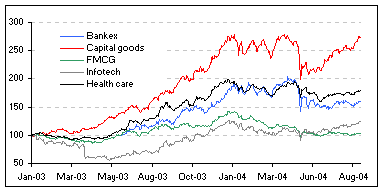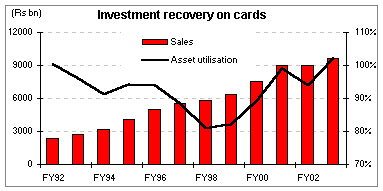After witnessing substantial gains in 2003, markets have remained lacklustre in last seven months of 2004. Just to give a perspective, Rs 100 invested in the Sensex on 1st Jan 2004 would have resulted in Rs 91 by the end of September 8th 2004 and so is the case with most of the sectors.
The graph below shows the performance of the various sectors over the period of time.

As can be seen from the graph above, the engineering sector has largely outperformed the others over the specified period of time (Rs 100 invested would have resulted into Rs 274). The FMCG sector has however underperformed (Rs 100 invested would have resulted into Rs 104) in the same period. Let us dwell more in to this trend and try to find the reason for the same.
The engineering industry derives its demand from capacity creations in core sectors viz., power, infrastructure, mining, oil and several other sectors including general manufacturing, consumer goods industry, automotive and process industries. Since the government is focusing a lot more on infrastructure development, because it is critical to sustain a higher economic growth rate, the engineering sector has benefited immensely from this focus.
As shown in the graph below, when the asset utilisation crosses the 100% limit for manufacturing companies (FY92), capacity additions are inevitable, if sales are to be increased. So the industry went in for capacity additions (capacities are added keeping in mind future demand). But most of the capacity came online between FY95 and FY97 and this was enough to meet demand till FY02.
However since then, we have not witnessed any significant capacity additions. As can be seen, asset utilisation stood at 103% during FY03. With the investment cycle on an upturn and the capacity addition plans announced by various industries like metals (steel, copper, zinc etc), refineries, power and textiles, the one industry that tends to benefit is the engineering sector. The swelling orderbook of engineering majors supports this argument.

While the engineering sector was among the top gainers in the last one and a half year, the FMCG sector was the top loser in the same time. Whereas
The penetration level of detergents and soaps is already above 90%. So growth will come either with a rise in population or if consumers start using higher end products or consuming more. However with falling interest rates consumer spending has shifted in part towards assets like consumer durables and houses. This has led to a fall in allocation of consumer spending on FMCG, not necessarily in terms of volumes but in terms of value.
Price cuts in the detergent and shampoo segments, were carried out, by the producers in order to spur spending on these articles. This was also done with a view to grab a larger chunk of the existing market.
However lower prices led to lower margins for most of the companies. Just to put things in perspective, Henkel has an operating margin of 2.5% as compared to the market leader who commands a margin of around 13% in 1HFY05 from 19% in FY04. Though margins cannot be compared on a like to like basis it gives an idea of how bad things can go. This pessimism prevalent in the market has led to a hammering of FMCG stocks on the bourses.
Having looked the performance of the various sectors in the current calendar year, the first question that comes to mind is 'How would one zero in on a sector whose prospects look attractive from a medium to long-term perspective?'
Here we would like to point out that it is indeed difficult even for the most acclaimed investor to consistently time markets and invest in a sector that would give superior returns over a given period.
The ideal solution would be to invest in a company with strong track record and competent management usually irrespective of the sector and have a long-term horizon in mind.
Equitymaster.com is one of India's premier finance portals. The web site offers a user-friendly portfolio tracker, a weekly buy/sell recommendation service and research reports on India's top companies.






 © 2025
© 2025